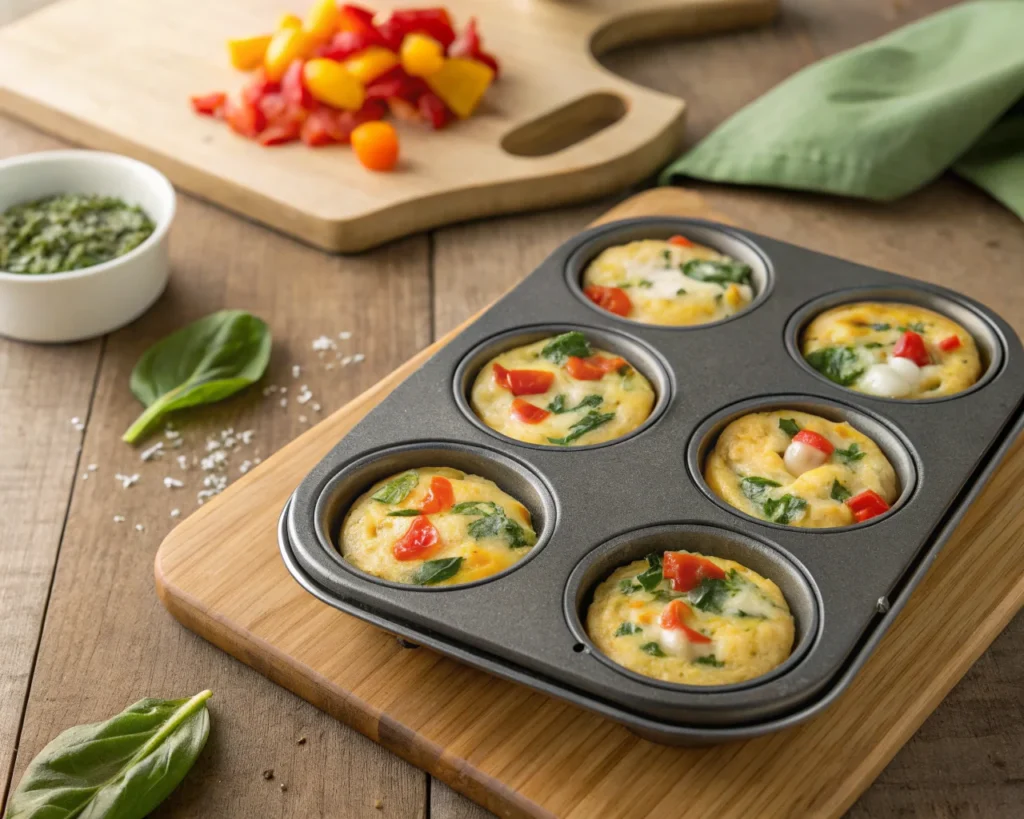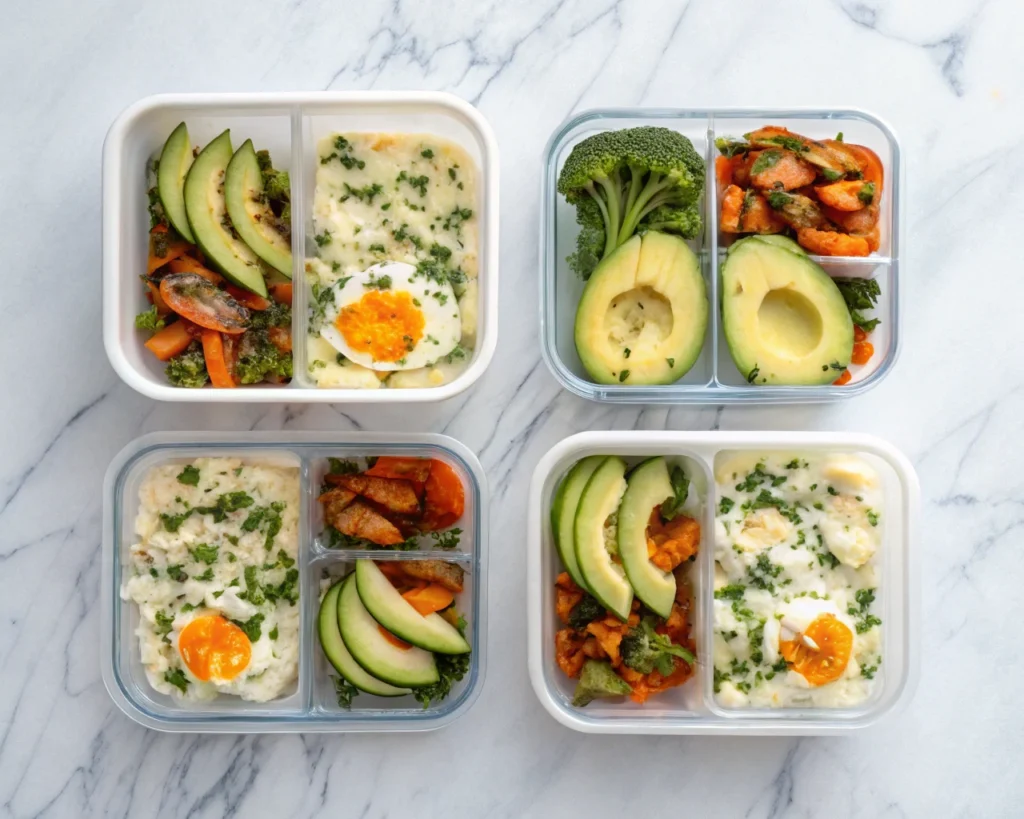Baked cottage cheese eggs are a nutritious, protein-packed meal that combines the creamy richness of cottage cheese with the fluffy texture of baked eggs. Whether you’re looking for a simple breakfast, a meal prep option, or a single-serving dish, this recipe is versatile and satisfying. Inspired by chefs like Jamie Oliver, Gordon Ramsay, and Stanley Tucci, this dish is easy to customize with different ingredients and flavors.
In this article, we’ll explore everything you need to know about baked cottage cheese eggs, from their benefits to step-by-step recipes. You’ll also learn how to avoid common mistakes, such as watery eggs, and find tips on making the perfect high-protein egg bake.
Table of Contents
Why Baked Cottage Cheese Eggs Are a Perfect Meal Choice
High Protein and Nutrient-Dense
One of the biggest benefits of baked cottage cheese eggs is their high protein content. Eggs are already an excellent source of protein, but adding cottage cheese boosts the protein levels even more. Cottage cheese contains casein protein, which digests slowly and helps keep you full for longer. This makes it a fantastic option for those following a high-protein diet or looking to maintain muscle mass.
Additionally, this dish provides essential nutrients such as calcium, vitamin B12, and healthy fats, which contribute to bone health, brain function, and overall well-being.
Great for Weight Management
Baked cottage cheese eggs are a low-calorie, high-protein dish that supports weight loss and maintenance. The combination of protein and healthy fats keeps you full and reduces cravings, making it easier to stick to a balanced diet. If you’re following a program like Weight Watchers, this dish fits well into meal planning with minimal points.
Easy to Customize
This recipe is highly versatile. You can add vegetables, herbs, and spices to enhance the flavor. Whether you prefer a simple baked egg dish or a fancier version with spinach, tomatoes, and feta cheese, there are countless ways to customize it to your taste.
Looking for more high-protein breakfast ideas? Check out this recipe collection for more inspiration.
How to Make Baked Cottage Cheese Eggs – Step-by-Step Recipe
Ingredients You’ll Need
To make a delicious and protein-packed baked cottage cheese eggs dish, you’ll need the following ingredients:
- 4 large eggs – The base of the dish, providing structure and protein.
- ½ cup cottage cheese – Adds creaminess and boosts protein content.
- ¼ cup milk or heavy cream – Helps create a fluffy texture.
- ¼ teaspoon salt – Enhances the flavor.
- ¼ teaspoon black pepper – Adds a bit of spice.
- ½ teaspoon garlic powder – Optional, but it gives a rich depth of flavor.
- ½ teaspoon dried oregano or thyme – Adds an aromatic touch.
- ½ cup shredded cheese (cheddar, feta, or Parmesan) – Melts beautifully for a cheesy finish.
- ½ cup chopped vegetables (spinach, bell peppers, mushrooms, or tomatoes) – Provides extra nutrients and texture.
- 1 tablespoon olive oil or butter – To grease the baking dish.
Instructions for Baking Cottage Cheese Eggs
Step 1: Preheat the Oven
Preheat your oven to 375°F (190°C). Lightly grease a small baking dish, ramekins, or a muffin tin with olive oil or butter to prevent sticking.
Step 2: Mix the Eggs and Cottage Cheese
In a large bowl, whisk the eggs until they are well combined. Add the cottage cheese and mix thoroughly. The cottage cheese may remain slightly lumpy, but this is fine, as it will melt and blend while baking.
Step 3: Add Seasonings and Extras
Stir in the milk or heavy cream, salt, pepper, garlic powder, and herbs. If you’re adding shredded cheese and vegetables, fold them in gently.
Step 4: Pour into Baking Dish
Pour the mixture evenly into the prepared baking dish or ramekins. If using a muffin tin, fill each cup about three-quarters full to allow space for the eggs to rise.
Step 5: Bake Until Set
Place the dish in the preheated oven and bake for 20-25 minutes, or until the eggs are firm and slightly golden on top. If using a muffin tin, check for doneness around 15 minutes, as smaller portions cook faster.
Step 6: Let It Cool and Serve
Remove the baked cottage cheese eggs from the oven and let them cool for a few minutes. Serve warm, garnished with fresh herbs or an extra sprinkle of cheese.
Variations of Baked Cottage Cheese Eggs

Baked cottage cheese eggs are incredibly versatile, allowing for various adaptations to suit different dietary preferences and flavor profiles. Whether you prefer a classic, high-protein version or want to experiment with bold flavors, here are some delicious variations to try.
1. High-Protein Egg Bake with Cottage Cheese
For those looking to maximize protein intake, this version includes extra protein-rich ingredients:
Ingredients:
- 5 large eggs
- ¾ cup cottage cheese
- ¼ cup Greek yogurt (adds extra protein and creaminess)
- ½ cup diced cooked chicken or turkey
- ½ teaspoon onion powder
- ½ teaspoon paprika
- ½ cup shredded mozzarella or Swiss cheese
Instructions:
- Follow the standard recipe instructions but add Greek yogurt and diced meat to the egg mixture.
- Bake at 375°F for 22-25 minutes, until the eggs are set.
This variation is perfect for athletes or anyone on a high-protein diet.
2. Baked Cottage Cheese Egg Muffins (Meal Prep Friendly)
For an easy grab-and-go option, try making cottage cheese egg muffins.
Ingredients:
- 4 large eggs
- ½ cup cottage cheese
- ½ cup diced bell peppers and spinach
- ¼ teaspoon salt
- ¼ teaspoon black pepper
- ¼ teaspoon chili flakes (optional)
- ½ cup shredded cheddar cheese
Instructions:
- Preheat oven to 375°F and grease a muffin tin.
- Mix all ingredients in a bowl and pour into muffin tin cups, filling each about ¾ full.
- Bake for 15-18 minutes or until eggs are set.
- Let cool before removing from the tin.
These muffins are perfect for meal prep and stay fresh in the fridge for up to 5 days.
3. Individual Baked Cottage Cheese Eggs (Single-Serving Option)
If you want a quick breakfast without leftovers, make a single-serving baked egg dish.
Ingredients:
- 1 large egg
- 2 tablespoons cottage cheese
- 1 tablespoon shredded Parmesan
- A pinch of salt and black pepper
- 1 teaspoon chopped fresh basil or chives
Instructions:
- Preheat the oven to 375°F and grease a small ramekin.
- Whisk the egg and cottage cheese together, then add the seasonings and Parmesan.
- Pour into the ramekin and bake for 12-15 minutes, or until the egg is fully set.
This variation is ideal for a quick and easy protein-packed breakfast.
Common Mistakes to Avoid When Making Baked Cottage Cheese Eggs
While baked cottage cheese eggs are easy to prepare, there are a few common mistakes that can affect the texture and taste of the final dish. Here’s how to avoid them for perfect results every time.
1. Watery Cottage Cheese Eggs
A common issue when making this dish is excess water, which can result in a soggy texture. Here’s why this happens and how to fix it:
Causes:
- Using low-fat or fat-free cottage cheese, which contains more water.
- Adding too many watery vegetables like tomatoes or mushrooms without draining them.
- Overmixing the eggs and cottage cheese, which can break down the curds and release moisture.
How to Fix It:
- Use full-fat cottage cheese for a creamier consistency.
- Drain excess liquid from vegetables before adding them.
- Lightly whisk the eggs and cottage cheese instead of overmixing.
2. Cottage Cheese Not Melting Properly
Some people expect cottage cheese to melt like shredded cheese, but that’s not the case. Cottage cheese softens and blends into the eggs, but it won’t fully melt.
Solution:
- Blend the cottage cheese in a food processor for a smoother texture before adding it to the eggs.
- Mix it with a small amount of milk or cream to help it distribute evenly.
3. Overcooked or Rubbery Texture
Baking eggs for too long or at too high a temperature can make them rubbery.
How to Prevent Overcooking:
- Bake at 375°F (190°C) for 20-25 minutes, checking for doneness around the 20-minute mark.
- Remove from the oven as soon as the eggs are firm in the center but still slightly soft. They will continue to cook slightly after being removed.
- Use an oven thermometer to ensure accurate temperature settings.
4. Eggs Not Setting Properly
If your baked eggs remain runny in the center, it could be due to incorrect ratios or an underheated oven.
Fixes:
- Use the correct egg-to-liquid ratio (too much milk or cottage cheese can make the eggs too loose).
- Preheat the oven fully before baking.
- Let the eggs rest for a few minutes after baking to help them firm up.
By avoiding these mistakes, you’ll achieve perfect baked cottage cheese eggs every time.
Health Benefits of Baked Cottage Cheese Eggs
Baked cottage cheese eggs are more than just a tasty breakfast—they offer a wide range of health benefits. From muscle-building protein to essential vitamins and minerals, this dish is a nutritional powerhouse. Here’s why you should include it in your diet.
1. High in Protein for Muscle Growth and Satiety
Protein is essential for muscle repair, recovery, and satiety. Both eggs and cottage cheese are excellent sources of high-quality protein.
- Eggs contain all nine essential amino acids, making them a complete protein source. One large egg provides about 6 grams of protein.
- Cottage cheese is rich in casein, a slow-digesting protein that helps keep you full for hours. A ½ cup of cottage cheese contains about 14 grams of protein.
- A single serving of baked cottage cheese eggs can provide over 20 grams of protein, making it an excellent post-workout meal or a filling breakfast.
2. Supports Bone Health
This dish is packed with calcium, vitamin D, and phosphorus—nutrients that are essential for strong bones.
- Calcium (found in both eggs and cottage cheese) is necessary for maintaining bone density and preventing osteoporosis.
- Vitamin D, present in egg yolks, helps the body absorb calcium more efficiently.
- Phosphorus works alongside calcium to strengthen bones and teeth.
3. Aids in Weight Management
Baked cottage cheese eggs are low in carbs and high in protein, making them a great choice for those following a weight-loss plan like Weight Watchers, keto, or low-carb diets.
- Protein keeps you full longer and helps reduce cravings.
- The healthy fats from eggs and cheese provide energy without spiking blood sugar levels.
- This dish is naturally low in calories (about 200-250 per serving), making it easy to fit into a calorie-controlled diet.
4. Boosts Brain Function
Eggs and cottage cheese contain several brain-boosting nutrients, including:
- Choline, found in egg yolks, supports memory, cognition, and brain health.
- Vitamin B12, present in both eggs and dairy, is essential for nerve function and energy production.
- Omega-3 fatty acids, found in pastured eggs, help reduce inflammation and improve mental clarity.
5. Helps with Digestion and Gut Health
Cottage cheese contains probiotics, which support gut health by promoting the growth of beneficial bacteria.
- If you choose cultured cottage cheese, you’ll get a dose of probiotics that improve digestion and boost immune function.
- The protein and healthy fats in this dish help stabilize blood sugar levels, preventing energy crashes and cravings.
With its impressive nutritional profile, baked cottage cheese eggs are an excellent addition to a healthy diet.
How to Customize Baked Cottage Cheese Eggs for Different Diets

Baked cottage cheese eggs are incredibly versatile and can be adapted to suit various dietary preferences. Whether you’re following a low-carb, vegetarian, or gluten-free diet, you can modify this dish to fit your needs.
1. Low-Carb & Keto-Friendly Version
For those following a keto or low-carb diet, baked cottage cheese eggs are already a great option since they are naturally low in carbohydrates. However, here’s how you can make them even more keto-friendly:
Modifications:
- Use full-fat cottage cheese instead of low-fat versions to increase healthy fat content.
- Add avocado slices or top with a dollop of sour cream for extra fats.
- Avoid starchy vegetables like potatoes and opt for low-carb options like spinach, mushrooms, and bell peppers.
- Sprinkle in bacon bits or sausage crumbles for additional protein and fats.
A single serving of this keto-friendly variation contains less than 5g net carbs, making it perfect for staying in ketosis.
2. Vegetarian Version
Baked cottage cheese eggs are naturally vegetarian-friendly, but you can enhance the flavor with plant-based ingredients.
Modifications:
- Add sautéed mushrooms, spinach, and bell peppers for extra nutrients.
- Mix in feta cheese or goat cheese for a tangy twist.
- Sprinkle with chopped fresh herbs like parsley, chives, or basil for a fresh taste.
- Serve with a side of whole grain toast or roasted sweet potatoes for a balanced meal.
This vegetarian variation is rich in fiber, vitamins, and antioxidants, making it a nourishing choice.
3. Gluten-Free Version
Baked cottage cheese eggs are naturally gluten-free, but if you’re sensitive to cross-contamination, consider these tips:
Modifications:
- Use certified gluten-free cottage cheese to avoid trace amounts of gluten.
- Ensure any added seasonings, sauces, or cheese blends are labeled gluten-free.
- Serve with a side of gluten-free toast or fresh fruit for a complete meal.
This version is perfect for those with celiac disease or gluten intolerance.
4. Dairy-Free Adaptation
If you’re lactose intolerant or avoiding dairy, you can still enjoy a delicious baked egg dish by making a few swaps.
Modifications:
- Use dairy-free cottage cheese alternatives made from almonds or cashews.
- Substitute regular cheese with nutritional yeast for a cheesy flavor.
- Replace milk or cream with unsweetened almond milk or coconut milk.
This version ensures that those with dairy allergies or sensitivities can still enjoy a high-protein breakfast.
5. Weight Watchers-Friendly Version
If you’re following the Weight Watchers program, this dish can be a great addition to your meal plan.
Modifications:
- Use low-fat cottage cheese to reduce SmartPoints.
- Stick to egg whites instead of whole eggs for a lower-calorie option.
- Add plenty of vegetables for extra fiber without adding points.
- Serve with a side of fruit instead of bread for a lighter option.
By making these small adjustments, baked cottage cheese eggs can fit into any diet while remaining flavorful and nutritious.
Serving Suggestions for Baked Cottage Cheese Eggs
Baked cottage cheese eggs are a versatile dish that pairs well with a variety of sides and toppings. Whether you’re serving them for breakfast, brunch, or even dinner, here are some delicious ways to enhance the meal.
1. Classic Breakfast Pairings
For a traditional breakfast, pair baked cottage cheese eggs with these sides:
- Whole-Grain Toast – A great source of fiber that complements the creamy texture of the eggs.
- Avocado Slices – Adds healthy fats and a creamy contrast.
- Roasted Sweet Potatoes – Provides a naturally sweet, nutritious balance to the savory eggs.
- Turkey or Chicken Sausage – A lean protein option that pairs well with baked eggs.
2. Low-Carb & Keto-Friendly Pairings
If you’re following a low-carb or keto diet, try serving baked cottage cheese eggs with:
- Sautéed Spinach or Kale – Adds extra vitamins and a pop of color.
- Bacon or Smoked Salmon – Provides additional protein and healthy fats.
- Grilled Asparagus – A light and nutritious low-carb vegetable.
- Avocado & Cherry Tomato Salad – A refreshing and satisfying side.
3. Brunch-Worthy Toppings
Elevate your baked cottage cheese eggs with these flavorful toppings:
- Fresh Herbs (Chives, Parsley, Basil) – Enhances freshness and aroma.
- Crumbled Feta or Goat Cheese – Adds a tangy, creamy bite.
- Salsa or Hot Sauce – For those who enjoy a spicy kick.
- Everything Bagel Seasoning – A trendy, flavorful addition.
4. High-Protein Meal Prep Combinations
For meal prep, consider pairing baked cottage cheese eggs with:
- Quinoa or Brown Rice – A great option if you need extra carbs for energy.
- Steamed Broccoli or Roasted Brussels Sprouts – Boosts fiber and nutrients.
- Greek Yogurt with Berries – A protein-packed, well-rounded meal.
5. Dinner-Style Serving Ideas
Who says eggs are only for breakfast? You can enjoy baked cottage cheese eggs as a light dinner by pairing them with:
- A Side Salad with Balsamic Dressing – Adds freshness and balance.
- Grilled Chicken or Shrimp – For a protein-packed meal.
- Ratatouille or Roasted Vegetables – A Mediterranean-inspired pairing.
By choosing the right sides and toppings, you can customize baked cottage cheese eggs to fit any occasion or dietary need.
Meal Prep and Storage Tips for Baked Cottage Cheese Eggs

Baked cottage cheese eggs are an excellent choice for meal prep, as they can be made ahead of time and stored for convenient, high-protein meals throughout the week. Below, we’ll cover the best ways to store, reheat, and keep them fresh for longer.
1. How to Store Baked Cottage Cheese Eggs
Proper storage is key to maintaining the texture and flavor of your baked eggs. Here’s how to do it:
- Refrigeration: Store baked cottage cheese eggs in an airtight container in the refrigerator for up to 4-5 days.
- Freezing: If you want to keep them longer, place them in a freezer-safe container or wrap individual portions in plastic wrap and freeze for up to 2 months.
2. Best Way to Reheat Baked Cottage Cheese Eggs
Reheating baked eggs properly ensures they stay soft and flavorful rather than dry and rubbery.
- Microwave: Heat individual portions on a microwave-safe plate for 30-45 seconds. If reheating from frozen, defrost overnight in the fridge before microwaving.
- Oven: Reheat at 300°F (150°C) for 5-10 minutes until warmed through. Cover with foil to prevent drying.
- Air Fryer: Heat at 300°F (150°C) for 3-4 minutes for a quick and crispy reheating option.
3. Meal Prep Ideas with Baked Cottage Cheese Eggs
Baked cottage cheese eggs work well for meal prep because they can be stored in different portion sizes:
- Muffin Tin Portions: Bake them in a muffin tin for easy grab-and-go breakfasts.
- Single-Serving Ramekins: Store in ramekins and reheat as needed for an individual meal.
- Large Casserole Style: Bake in a larger dish and cut into squares for meal prep containers.
4. How to Prevent Soggy Texture After Storing
One common issue with reheating baked eggs is excess moisture. Here’s how to keep them from becoming watery:
- Cool Completely Before Storing: Let the eggs cool to room temperature before placing them in the fridge.
- Use a Paper Towel in the Container: Place a paper towel under the eggs to absorb excess moisture.
- Reheat Gently: Avoid overheating, as this can cause the eggs to release more water.
5. Can You Make Baked Cottage Cheese Eggs Ahead of Time?
Yes! You can prepare the egg mixture the night before and store it in the fridge. When ready to bake, simply pour the mixture into a greased baking dish and cook as directed.
With proper storage and reheating techniques, baked cottage cheese eggs can be a convenient and delicious part of your weekly meal prep routine.
Frequently Asked Questions About Baked Cottage Cheese Eggs
Many people have questions about baking eggs with cottage cheese, especially when it comes to texture, flavor, and cooking techniques. Below, we answer some of the most common questions to help you make the perfect dish every time.
1. What Does Adding Cottage Cheese to Eggs Do?
Cottage cheese enhances baked eggs by:
- Boosting protein – Cottage cheese is packed with casein protein, which helps keep you full longer.
- Creating a creamy texture – Unlike regular cheese, cottage cheese adds moisture and softness to baked eggs.
- Enhancing flavor – It adds a mild, tangy taste that complements eggs well.
2. Does Cottage Cheese Melt When Baked?
No, cottage cheese does not melt the way shredded cheese like cheddar or mozzarella does. Instead, it softens and blends into the eggs, creating a smooth, creamy consistency. If you prefer a more uniform texture, blend the cottage cheese before mixing it with the eggs.
3. Why Are My Cottage Cheese Eggs So Watery?
Watery baked eggs can be caused by:
- Low-fat cottage cheese – Fat-free and low-fat varieties contain more liquid, which can make eggs runny.
- Excess moisture from vegetables – Ingredients like tomatoes and mushrooms release water when cooked.
- Overmixing the eggs – This can break down the structure, causing excess liquid to separate.
How to fix it:
- Use full-fat cottage cheese for a creamier texture.
- Sauté vegetables first to remove extra moisture before adding them to the egg mixture.
- Whisk gently to combine ingredients without breaking down the eggs too much.
4. Can You Bake with Cottage Cheese?
Yes! Cottage cheese is a great ingredient for baking. It works well in recipes for:
- Egg bakes and frittatas – Adds protein and moisture without making the dish heavy.
- Cheesecakes and pancakes – Gives a light, creamy texture.
- Casseroles and pasta bakes – Works as a lower-fat alternative to ricotta cheese.
5. Is Baked Cottage Cheese Egg Recipe Good for Weight Loss?
Yes! This dish is perfect for weight loss because:
- It’s high in protein, which keeps you full longer and prevents snacking.
- It’s low in carbs, making it great for keto and low-carb diets.
- It’s naturally portion-controlled, especially when baked in muffin tins or ramekins.
For those on Weight Watchers, using low-fat cottage cheese and egg whites can reduce SmartPoints while still providing a satisfying meal.
Final Thoughts
Baked cottage cheese eggs are a delicious, nutritious, and versatile meal option that can fit into almost any diet. Whether you’re looking for a high-protein breakfast, a weight-loss-friendly dish, or a quick meal prep idea, this recipe has you covered.
By following the tips in this guide, you can customize your baked eggs to suit your taste, avoid common mistakes, and store them properly for easy meals throughout the week.
Looking for more healthy breakfast ideas? Check out this collection of protein-packed recipes.
Conclusion: Why You Should Try Baked Cottage Cheese Eggs
Baked cottage cheese eggs are the perfect balance of nutrition, flavor, and convenience. This high-protein dish is not only easy to prepare but also adaptable to various dietary needs, whether you’re following a low-carb, keto, vegetarian, or weight-loss-friendly meal plan.
With their creamy texture and delicious taste, baked cottage cheese eggs can be enjoyed as a quick breakfast, a meal prep option, or even a light dinner. Plus, by customizing the recipe with your favorite vegetables, herbs, and cheeses, you can create endless variations to suit your taste.
If you’ve struggled with watery eggs, uneven textures, or flavor imbalances, the tips and techniques shared in this guide will help you master this dish. From proper ingredient selection to the best storage and reheating methods, you now have all the information needed to make perfect baked cottage cheese eggs every time.
Final Thoughts & Next Steps
Now it’s time to put your knowledge to use! Try out this recipe and experiment with different variations to find your favorite combination.
Looking for more high-protein breakfast ideas? Don’t miss our collection of easy, healthy recipes to keep your mornings delicious and nutritious.

Creamsicle Cheesecake: A Delicious Citrus-Inspired Dessert
Creamsicle cheesecake is the perfect fusion of creamy cheesecake and the nostalgic flavors of an orange creamsicle. This dessert brings together a velvety, citrus-infused cheesecake filling with a buttery crust, offering a delightful balance of tangy and sweet flavors. Whether baked or no-bake, this treat is a showstopper for any occasion. In this article, we’ll … Read more

Fresh Squeezed Orange Juice: Health Benefits, Recipes, and Expert Tips
Nothing compares to the refreshing taste of fresh squeezed orange juice—it’s vibrant, packed with nutrients, and a natural energy booster. Whether you enjoy it as part of your morning routine or as a midday pick-me-up, this juice offers more than just a delicious flavor—it’s loaded with health benefits that can support your immune system, aid … Read more

The Ultimate Guide to Sweet Potato Puree: Health Benefits, Recipes, and Uses
Sweet potato puree is a versatile and nutrient-packed ingredient that deserves a place in every kitchen. Whether you’re preparing meals for a baby, crafting gourmet dishes, or baking something comforting, this vibrant orange puree offers both flavor and health benefits. Rich in vitamins, fiber, and natural sweetness, it’s no wonder chefs like Gordon Ramsay and … Read more

